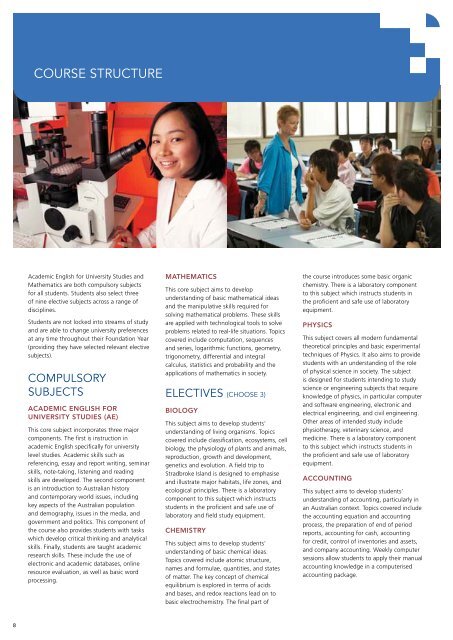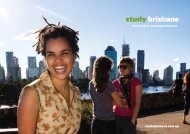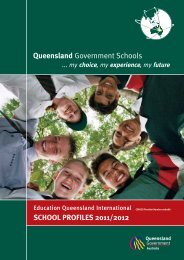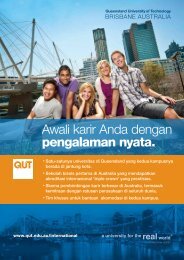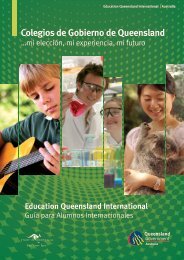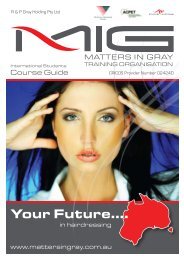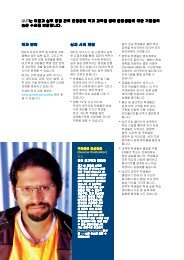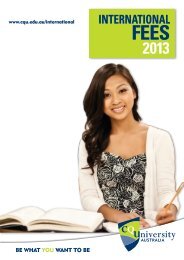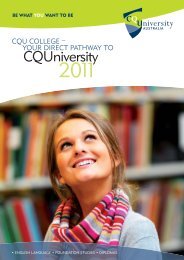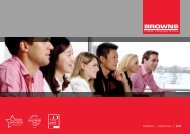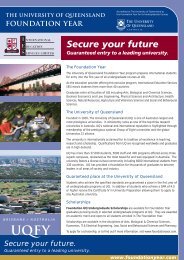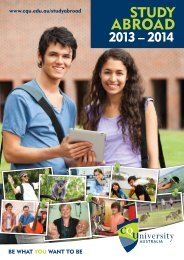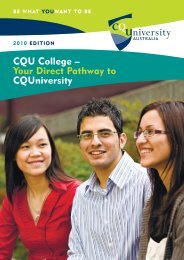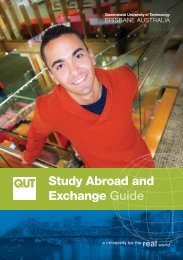The Foundation Year 2010-2011 THE FOUNDATION YEAR
The Foundation Year 2010-2011 THE ... - Study Brisbane
The Foundation Year 2010-2011 THE ... - Study Brisbane
Create successful ePaper yourself
Turn your PDF publications into a flip-book with our unique Google optimized e-Paper software.
COURSE STRUCTURE<br />
COURSE STRUCTURE<br />
Academic English for University Studies and<br />
Mathematics are both compulsory subjects<br />
for all students. Students also select three<br />
of nine elective subjects across a range of<br />
disciplines.<br />
Students are not locked into streams of study<br />
and are able to change university preferences<br />
at any time throughout their <strong>Foundation</strong> <strong>Year</strong><br />
(providing they have selected relevant elective<br />
subjects).<br />
COMPULSORY<br />
SUBJECTS<br />
ACADEMIC ENGLISH FOR<br />
UNIVERSITY STUDIES (AE)<br />
This core subject incorporates three major<br />
components. <strong>The</strong> first is instruction in<br />
academic English specifically for university<br />
level studies. Academic skills such as<br />
referencing, essay and report writing, seminar<br />
skills, note-taking, listening and reading<br />
skills are developed. <strong>The</strong> second component<br />
is an introduction to Australian history<br />
and contemporary world issues, including<br />
key aspects of the Australian population<br />
and demography, issues in the media, and<br />
government and politics. This component of<br />
the course also provides students with tasks<br />
which develop critical thinking and analytical<br />
skills. Finally, students are taught academic<br />
research skills. <strong>The</strong>se include the use of<br />
electronic and academic databases, online<br />
resource evaluation, as well as basic word<br />
processing.<br />
MA<strong>THE</strong>MATICS<br />
This core subject aims to develop<br />
understanding of basic mathematical ideas<br />
and the manipulative skills required for<br />
solving mathematical problems. <strong>The</strong>se skills<br />
are applied with technological tools to solve<br />
problems related to real-life situations. Topics<br />
covered include computation, sequences<br />
and series, logarithmic functions, geometry,<br />
trigonometry, differential and integral<br />
calculus, statistics and probability and the<br />
applications of mathematics in society.<br />
ELECTIVES (CHOOSE 3)<br />
BIOLOGY<br />
This subject aims to develop students’<br />
understanding of living organisms. Topics<br />
covered include classification, ecosystems, cell<br />
biology, the physiology of plants and animals,<br />
reproduction, growth and development,<br />
genetics and evolution. A field trip to<br />
Stradbroke Island is designed to emphasise<br />
and illustrate major habitats, life zones, and<br />
ecological principles. <strong>The</strong>re is a laboratory<br />
component to this subject which instructs<br />
students in the proficient and safe use of<br />
laboratory and field study equipment.<br />
CHEMISTRY<br />
This subject aims to develop students’<br />
understanding of basic chemical ideas.<br />
Topics covered include atomic structure,<br />
names and formulae, quantities, and states<br />
of matter. <strong>The</strong> key concept of chemical<br />
equilibrium is explored in terms of acids<br />
and bases, and redox reactions lead on to<br />
basic electrochemistry. <strong>The</strong> final part of<br />
the course introduces some basic organic<br />
chemistry. <strong>The</strong>re is a laboratory component<br />
to this subject which instructs students in<br />
the proficient and safe use of laboratory<br />
equipment.<br />
PHYSICS<br />
This subject covers all modern fundamental<br />
theoretical principles and basic experimental<br />
techniques of Physics. It also aims to provide<br />
students with an understanding of the role<br />
of physical science in society. <strong>The</strong> subject<br />
is designed for students intending to study<br />
science or engineering subjects that require<br />
knowledge of physics, in particular computer<br />
and software engineering, electronic and<br />
electrical engineering, and civil engineering.<br />
Other areas of intended study include<br />
physiotherapy, veterinary science, and<br />
medicine. <strong>The</strong>re is a laboratory component<br />
to this subject which instructs students in<br />
the proficient and safe use of laboratory<br />
equipment.<br />
ACCOUNTING<br />
This subject aims to develop students’<br />
understanding of accounting, particularly in<br />
an Australian context. Topics covered include<br />
the accounting equation and accounting<br />
process, the preparation of end of period<br />
reports, accounting for cash, accounting<br />
for credit, control of inventories and assets,<br />
and company accounting. Weekly computer<br />
sessions allow students to apply their manual<br />
accounting knowledge in a computerised<br />
accounting package.<br />
8


